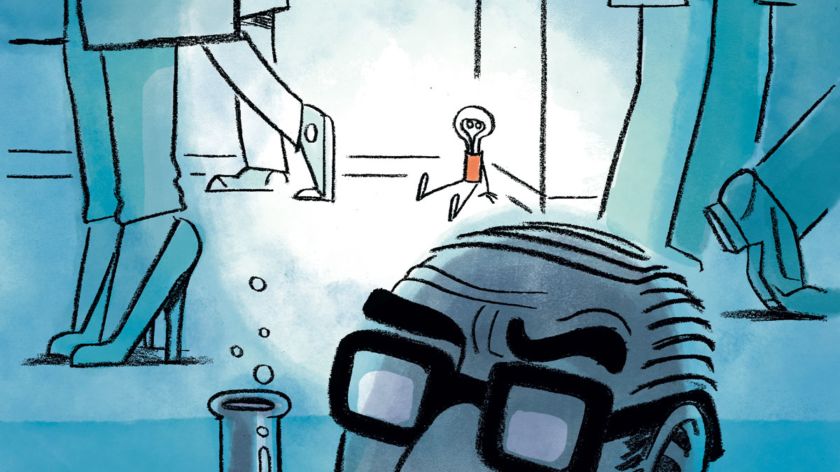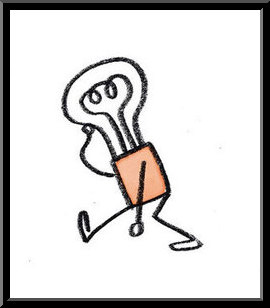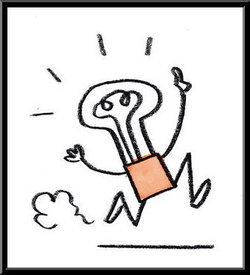Lucky breaks in science
-
 Illustratie: Roel Venderbosch
Illustratie: Roel Venderbosch
Many lucky breaks in science start as something trivial, so they are easily overlooked. Researchers who can provide the right impetus are desperately needed. 'We could just as well have said, ‘This is not what we’re looking for. Let’s ignore it.’
There is no better example of lucky breaks in science than the discovery of penicillin in 1928. Scotsman Alexander Fleming was studying a type of bacteria and was not looking for antibiotics at all. The lucky happenstance was that he did not clean up his laboratory when he went on holiday. Upon his return home, the glass covering one of the culture dishes had slid off, and a fungus had started to grow inside the dish. And in the spot where this fungus had grown, all the bacteria had disappeared. As it turned out, this fungus, with the beautiful name Penicilium notatum, secreted a bactericidal substance.
Here in Nijmegen, we also have examples of such lucky breaks. And just like Fleming’s major discovery they had rather trivial beginnings. Take, for instance, the Organic Chemistry postdoc who after an average work day placed a gel in the fridge and made a puzzling discovery the next day: the gel had become liquid. Everyone knows that pudding always hardens when refrigerated, so what was this stuff?
Or a certain coffee break at the Epidemiology department at Radboud university medical center. ‘Wouldn’t it be nice if we discovered an antimalarial medication that not only cures the patient but also kills the mosquito,’ mused malaria researcher Teun Bousema while sipping from his mug. This provided the spark of an idea to one of his older colleagues who was sitting at the same table.
Then there is linguist Mark Dingemanse, who, while taking the minutes of a meeting of international researchers, noticed that a certain word occurred very often in the presentations of his fellow linguists. The word was short and had the same vowel in all of those languages. ‘I remember how surprised I was. It was really weird, especially because all the other expressions in those languages were so different.’
Dead as a doornail
The fact that lucky breaks in science often seem so trivial at first constitutes a significant pitfall. Their trivial nature makes these lucky breaks easy to miss. This is why researchers are needed who can recognise the value of these coincidences or, better yet, actively seek them out. The Organic Chemistry postdoc’s gel resulted in a publication in Nature, due to the substance having such unique qualities. The burn centre in Beverwijk is interested in plasters made out of this gel. You can spray the substance on a wound and, due to the body’s temperature, it sticks. A little cold water will make the plaster liquid again, making it easy to wash off the skin. But the postdoc who discovered the gel may just as easily have washed it down the sink.
 ‘It’s not uncommon for us to see strange occurrences in our experiments,’ says Paul Kouwer from Organic Chemistry, who supervised the postdoc together with Professor of Molecular Materials Alan Rowan. ‘But the point is that you need to recognise them as special. Our postdoc thought, ‘Hang on, that’s not what I was expecting.’ He then decided to make the time to study this substance. In our case, ‘making the time’ lasted two years. And now half of our department’s research involves this substance.’
‘It’s not uncommon for us to see strange occurrences in our experiments,’ says Paul Kouwer from Organic Chemistry, who supervised the postdoc together with Professor of Molecular Materials Alan Rowan. ‘But the point is that you need to recognise them as special. Our postdoc thought, ‘Hang on, that’s not what I was expecting.’ He then decided to make the time to study this substance. In our case, ‘making the time’ lasted two years. And now half of our department’s research involves this substance.’
During one of those coffee breaks at the Epidemiology department at the hospital, the older colleague of Teun Bousema talks about that unusual day in the Malaria lab fifteen years ago. That morning, he entered the laboratory where for the past years ongoing research into the behaviour of the malaria mosquito had been conducted. Immediately he knew that something wasn’t right. And he was right, because from one day to the next all the mosquitoes in the lab were dead as doornails. All of them. The reason? The previous day they had ingested some of the drug ivermectin through their blood meal from laboratory animals. These animals had received this drug, which was originally intended to deworm cattle and keep them healthy. This deworming treatment had unexpected side effects: it paralysed the nerve and muscle cells in mosquitoes, with fatal consequences.
‘After my comment, we dusted off that old data and took a fresh look at it,’ Bousema recounted. ‘We realised that this was what we were looking for. We then started investigating whether ivermectin can be safely used in combination with antimalarial drugs.’ And it could. Bousema then developed a medicine mixture that not only cures the infected person, but also kills the mosquito. At a recent meeting of the World Health Organisation, he received enthusiastic reactions. ‘The question now is whether and how we can use the drug on a large scale.’
The New York Times
Who would possibly want to research the word ‘huh’? When linguist Mark Dingemanse hears that question yet again, he answers that this was never his intention. The discovery of that short word, which was featured in newspapers worldwide, was a coincidental finding of a larger study into misunderstandings in communication. Dingemanse and his colleagues wanted to ascertain how people in different parts of the world resolve misunderstandings. Do they request clarification? Do they repeat what the other person said? Do they ask an affirmative or negative question? A dozen international researchers were charged with finding the answers to these questions for their own language. ‘Every so often there was a meeting in which everyone discussed examples of misunderstandings in the language that he or she was studying.’ During that fateful meeting Dingemanse heard the word ‘huh’ so often that a light bulb turned on in his head. He had to get to the bottom of this. With two colleagues, he analysed recordings of the word in the different languages. ‘It was then that we knew that we were on to something.’ As The New York Times later called it, ‘The Syllable Everyone Recognizes’. Or, because without this word conversations would stall constantly, ‘Das wichtigste Wort der Welt’ (Süddeutsche Zeitung).
A sidetrack which turned out to be rewarding, is one way to look at this coincidental discovery. ‘We were not looking for universal words at all. We just wanted to know whether languages found similar solutions to misunderstandings.’ The challenge is that you never know in advance which sidetrack will be rewarding. So is it even possible to guide chance?
Randomly following all sidetracks is not an option, as this is too expensive and time-consuming. Chemist Kouwer says, ‘When confronted by something strange, you always need to consider whether it is worth investing time into.’ His department does not have a protocol or roadmap for this. ‘It’s just a feeling that something could lead to a whole new direction.’
 A beautiful publication
A beautiful publication
In the High Field Magnet Laboratory (HFML) this feeling is pretty common. The magnets there are so strong that materials often spontaneously do unexpected things. This sometimes results in lucky breaks that seem truly special. Like the time chemist Daniela Wilson and a PhD candidate placed their colleagues’ recently manufactured nanospheres under the magnet. The spheres were a promising transport mechanism for medicines in the body. ‘Using the magnets, we wanted to transform the spheres into a kind of rocket, so they would move quicker,’ says physics professor Peter Christianen, who collaborated with Wilson on this.
Once under the magnetic field the spheres spontaneously opened up. ‘At which time we thought ‘this is even better.’’ Especially when it turned out the spheres closed up again after the magnetic field was turned off. This means that a dose of medicine, dispatched via the nanospheres, can be released at any desired place in the body by using magnets. And at any time. Christianen and Wilson immediately modified their research programme. ‘We immediately thought that this will make a beautiful publication.’ Looking back, Christianen realised how lucky they were. ‘We used whichever spheres were available and they just so happened to have characteristics that responded in a certain way to our magnetic field. All the forces and reactions were just right. If the properties were just a fraction different, we never would have discovered this effect.’ And yet, he also realises that he and Wilson gave chance a helping hand. ‘We might just as well have said, ‘This is not what we’re looking for. Let’s ignore it.’ You need to spot that something exceptional has happened. You need to be able to appreciate the unexpected.’
This is exactly why malaria researcher Bousema views his findings in a slightly different way these days. ‘Now, when I make an accidental discovery, I take a moment to reflect on whether this could be a useful discovery.’ Since his lucky break, Dingemanse now too takes the time to reflect on unexpected results in his research. ‘I’ve learned that it’s crucial to always be prepared for the unexpected. But that is in fact the essence of science: always question everything, including your own favourite theories and the dogmas of your field.’
[kader-xl]
Five tips for improving the chance of your eureka moment.
#1 START A COMPETITION. You can sit in your study and try to come up with everything yourself or you can start a competition to encourage interesting findings. Chemistry professor Wilhelm Huck and Immunology professor Carl Figdor formulated a hypothesis about using the body’s own immune system to fight cancer. A competition was organised to encourage fellow researchers to find the solution. The first prize was a weekend trip to Paris. ‘Two completely new insights arose,’ says Wilhelm Huck.
#2 INVESTIGATE THE SIDETRACKS. Give seemingly odd sidetracks a chance. And who better to draw your attention to chance findings than colleagues who are familiar with those other routes? Chemistry professor Jan van Hest regularly visits a related group in Eindhoven to discuss research themes in an informal setting. The fresh, mathematical eye of the group in Eindhoven sometimes casts new light on the matter, allowing Van Hest to return to Nijmegen with an interesting finding. As it turns out, Van Hest will soon be moving from Radboud University to Eindhoven University of Technology.
#3 EXERCISE. Professor of Cognitive Psychology Harold Bekkering enjoys going for a run ‘to escape the usual routine for a bit.’ He believes all exercise is beneficial, possibly because it improves circulation in the brain. He feels that breaking out of his fixed routine increases the chance of a chance discovery. Sitting with a colleague after a run even stimulated a new research line: a new perspective on the workings of mirror neurons, which led to an article in Nature.
#4 IGNORE THE HIERARCHY. Ask young researchers and students to provide their insight to your experiments. This is a lesson learned by physicist Alexey Kimel, who several years ago was confronted with a stagnated study. It was a student who motivated the professor to take his research on the polarity of magnets in a new direction. ‘We permanent staff don’t know everything, after all. The solution to a problem can come from anywhere.’
#5 MIX UP THE RESEARCH TEAM. If you’d like to provide an impetus to Study A through the research of Study B, put A and B together in the same room. With this strategy, Peter Hagoort, Director of the Donders Institute, has been improving the chances of eureka moments for years now: postdocs and PhD candidates from different research groups share a room in the institute. ‘This greatly increases the chance of gaining new insights.’
[/kader-xl]



